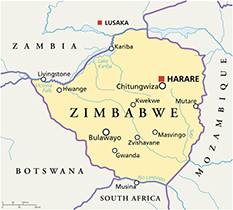Impact and Process Evaluation of Zimbabwe’s National Harmonized Social Cash Transfer Program
 Background
Background
In 2004, over 68 percent of Zimbabwe’s population was below the international poverty line, but this number is most likely much higher today due to subsequent poor economic development. A majority of Zimbabweans lack sufficient resources to provide nutritional meals, access to health care, school supplies, and clothing to their family on a regular basis. To address these problems, Zimbabwe’s Ministry of Labor and Social Services (MoLSS) implemented an enhanced social protection program as part of its National Action Plan for Orphans and Vulnerable Children. However, the program suffered due to a poor economy, extreme inflation, and other factors that led to underfunding and delivery problems.
Program Details
AIR conducted an impact and process evaluation of Zimbabwe’s Harmonized Social Cash Transfer (HSCT) program. The HSCT focused on strengthening the household economy through the delivery of cash transfers. The program provides a monthly stipend to households. AIR’s impact evaluation assessed short-term impacts to child nutrition, food security, household resiliency, use of health and education services, adolescent development, health, wealth, and productivity. We also conducted a process evaluation to assess the fidelity of implementation, and a cost-effectiveness analysis. The evaluation was a mixed methods, longitudinal quasi-experimental design with 3,000 households in 90 Wards across six districts. We collected a baseline and 12-month follow-up survey to assess the impact of the program.
